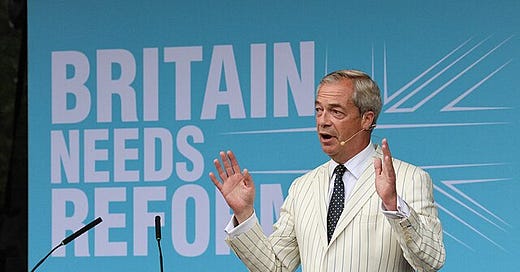Why Farage is right about the two-child benefit cap
Reform’s welfare measures show it is serious about both reducing poverty and supporting families to have children
Earlier this week, Reform UK leader Nigel Farage announced that his party will both restore the winter fuel allowance for pensioners and end the two-child benefit cap, which prevents most families from claiming means-tested benefits for any third or additional children born after April 2017. Farage argued that Reform wanted to go "much further to encourage people to have children, to make it easier for them to have children.”
This has drawn criticism from both the Conservatives and Labour, who have criticised Farage for being fiscally irresponsible.
Keir Starmer claimed that Farage’s “fantasy” economic plans would lead to a Liz Truss-style market crash. Conservative Party leader Kemi Badenoch accused Reform and Labour of indulging in “fantasy economics” over their approaches to welfare policies.
In a piece for the Daily Mail, Badenoch said that both Starmer and Farage want to force taxpayers to “fund unlimited child support for others”. Her comments come after the Labour Party indicated that it would look at scrapping the two-child benefit cap.
In a fiery polemic, she argued that Labour and Reform are “in a race to the bottom to scrap the two-child benefit cap”.
There is much to say on this current disagreement between the three main parties, but firstly, it seems odd to me that a relatively small spending commitment would cause such a strong reaction. Lifting the two-child benefit cap would cost an estimated £3.5 bn. Restoring the winter fuel payment, meanwhile, will cost £1.4 bn. For context, last year’s Autumn budget set out planned increases in public spending of an average of £69.5bn, half of which is funded through debt. It’s therefore hypocritical of Starmer to attack Farage for unfunded spending commitments as he did on Thursday, given his own government’s poor record.
The Conservatives, likewise, have lost all credibility when it comes to fiscal responsibility. While they were in government, the UK national debt increased by over £1 trillion.
Both welfare measures announced by Reform UK could be funded by cutting foreign aid, £5 bn of which is spent on housing illegal migrants in hotels. If deporting illegal immigrants, as Farage plans to do, is the cost of helping struggling pensioners and families, then surely this is something we should all support. Indeed, most people think it’s incredibly unfair that pensioners freeze at home and parents struggle to feed their children, while illegal immigrants get free food and lodgings in hotels around the country, all at the taxpayer’s expense.
Additionally, as The Telegraph reported this week, foreigners in the UK claim £1 bn a month in benefits. Therefore, to say that Reform’s welfare commitments are unaffordable is untrue. What is unaffordable is an open-borders immigration policy, which is costing the British taxpayer over £17 bn a year.
Badenoch’s mean-spirited attack on child benefit ignores the human cost of continuing with the cap. According to the government’s figures, 109 children are pulled into poverty every day by the limit. The Resolution Foundation, meanwhile, says that the child benefit cap will increase the number of children in poverty from 4.5 million today to 4.8 million by the next election.
In addition to increasing child poverty, the two-child benefit cap also tragically increases the number of abortions. Research conducted by the British Pregnancy Advisory Service found that the two-child limit is a significant factor in women’s decisions around whether or not to have an abortion. Furthermore, according to a government study, women living in the most deprived areas of England are more than twice as likely to have abortions, suggesting a strong link between poverty and abortion. As well as this, a report from UKRI suggests that one in five women who had an abortion cited the cost of childcare as a primary reason.
Child benefit, therefore, is not just a nice thing for families to have. It is essential to the health and well-being of children, both born and unborn. According to Torsten Bell, a Labour Treasury minister and former chief executive of the Resolution Foundation, scrapping the two-child benefit cap would lift 470,000 children out of poverty.
By choosing to scrap the two-child benefit cap, Reform is showing itself to be a party that is truly committed to tackling child poverty and making life easier for struggling families. Part of Farage’s justification for scrapping the limit is to make it easier to have children. Rather than attacking Reform for supporting families, other parties should be seeking to at least match its commitments on welfare to ensure that no woman is forced to end a pregnancy because of financial hardship.
Reform’s welfare proposals shift the party towards the centre-ground, which is good politics. However, for the party to be fully trusted on fiscal responsibility, it will need to quietly drop some of its more expensive tax proposals.
According to the Institute for Fiscal Studies, the cost of Reform’s welfare commitments (£5 bn) is dwarfed by the cost of its tax policies. One of its proposed tax cuts, raising the personal allowance from £12,570 to £20,000, could cost between £50bn and £80bn a year – more than the entire defence budget.
In a country with an ageing population, addressing the child deficit is just as important as reducing the budget deficit. Encouraging young couples to have children is essential to ensuring the UK has a large enough workforce in 20 years' time to support the growing number of retirees. Raising Britain’s birthrate should therefore be seen as a national priority. Farage’s promise to scrap the two-child benefit cap is welcome, but it ought to be part of a broader cultural shift that reasserts the value of both family and children.




